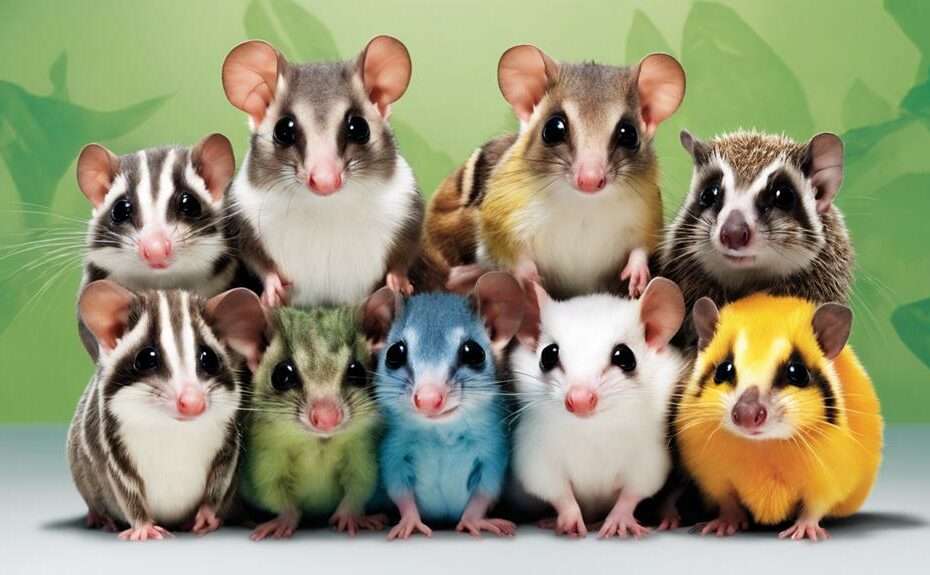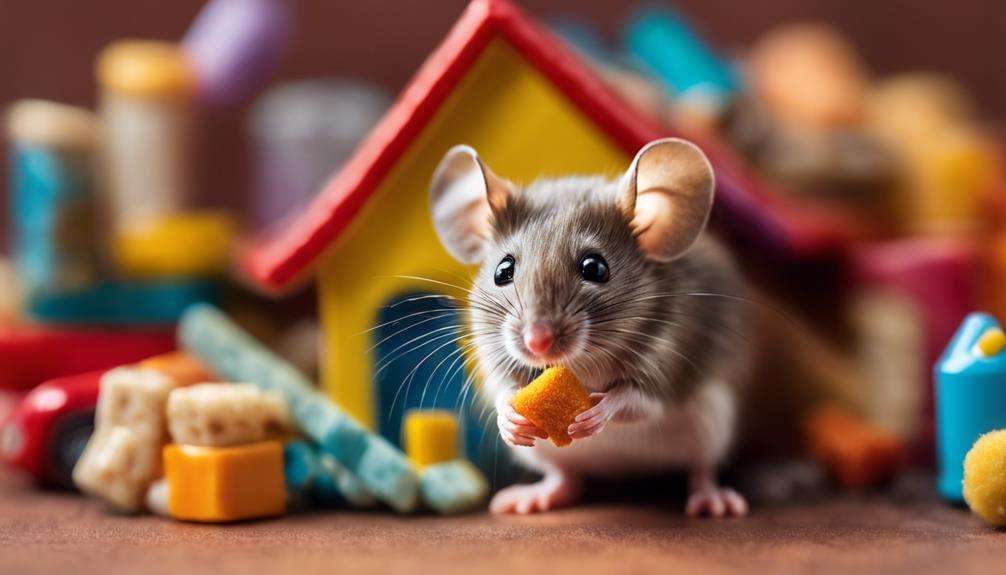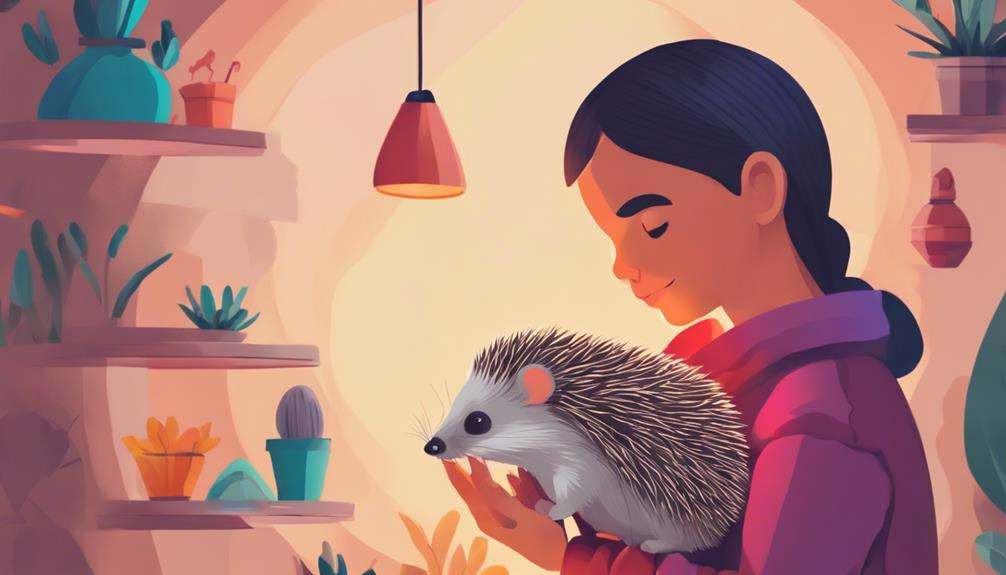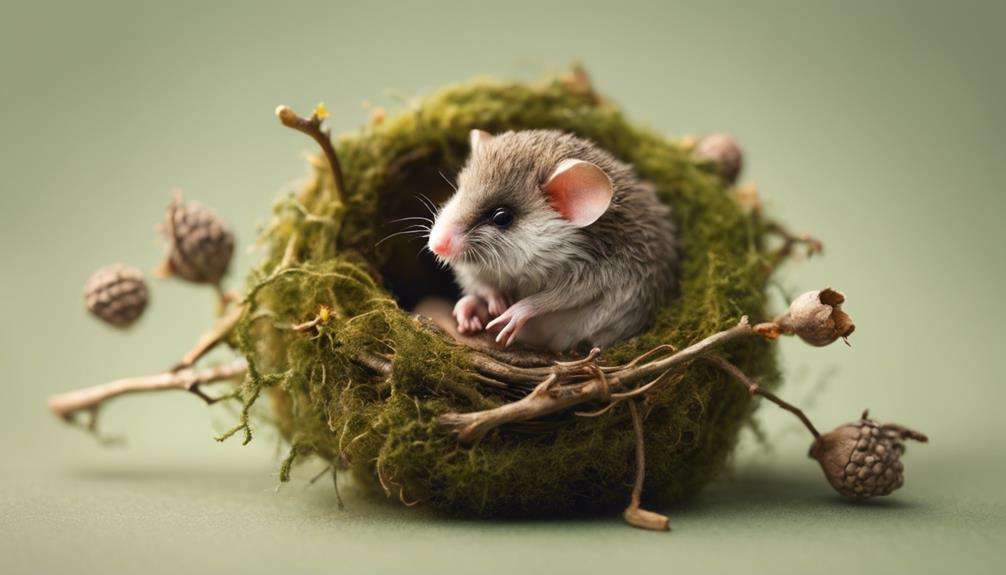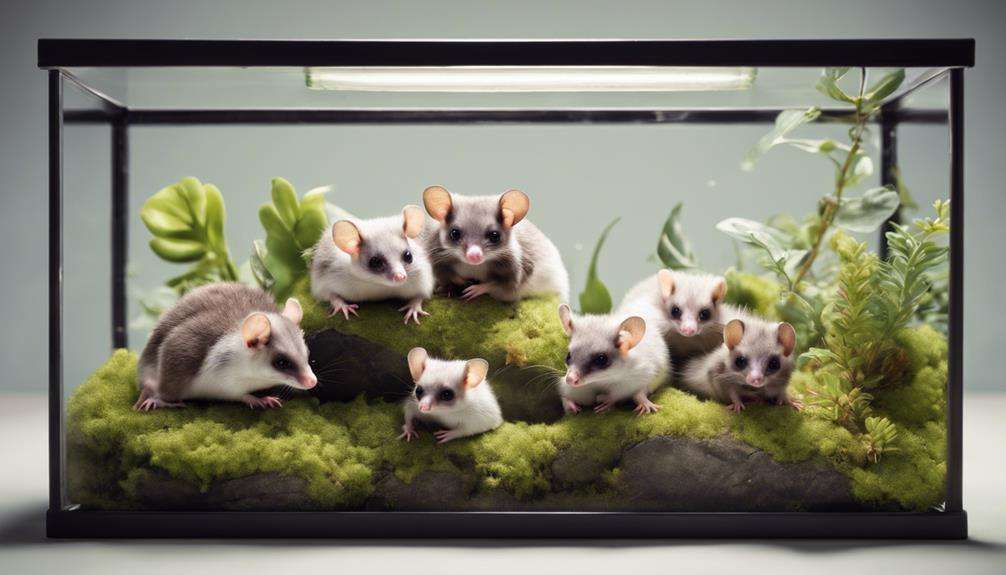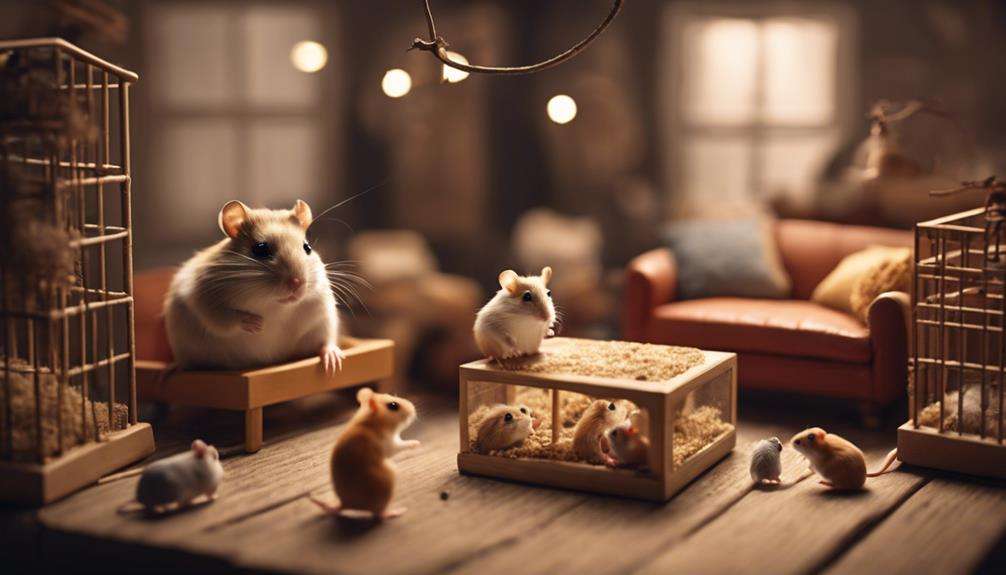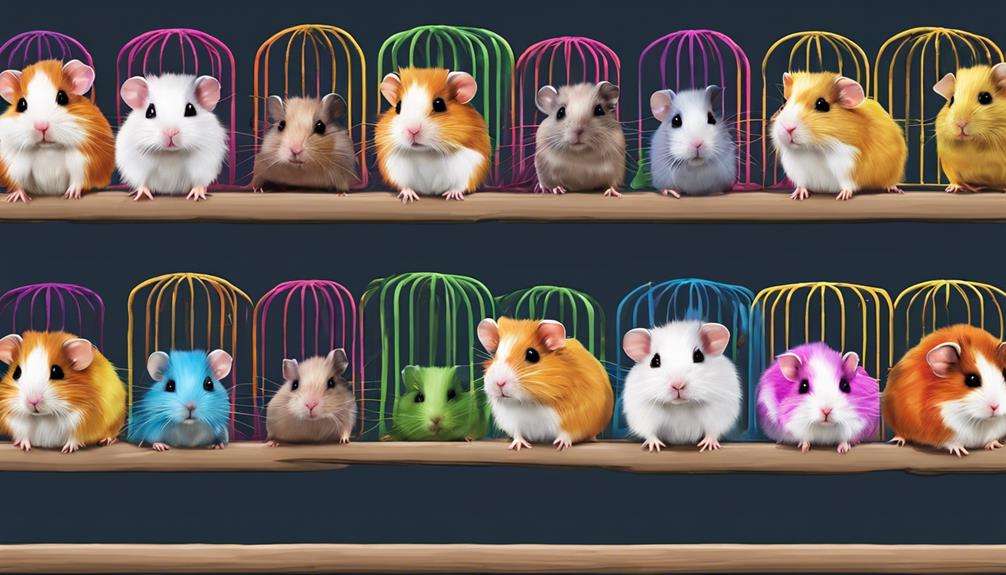If you're looking for a pocket pet that stands out from the crowd, remember that good things come in small packages.
Imagine discovering a world of intriguing companionship beyond the ordinary hamster or guinea pig.
These five best lesser-known pocket pet mammals might just surprise you with their unique personalities and charm.
So, why not take a moment to explore the enchanting world of these delightful creatures and see what makes them such intriguing choices for those seeking a special connection with a furry friend?
Key Takeaways
- Jerboas and pygmy possums are unique pocket pets from diverse regions with specialized diets and nocturnal habits.
- African dormice and fat-tailed gerbils offer engaging companionship with their arboreal skills and social nature.
- The pygmy jerboa, a delicate rodent, showcases remarkable hopping abilities but requires careful care and conservation measures.
- Lesser-known pocket pets like these offer a fascinating alternative to traditional small animal companions.
Pocket Pet Mammal: Jerboa
In the deserts of North Africa and Asia, Jerboas, small rodents renowned for their kangaroo-like hopping abilities, thrive with their long hind legs adapted for efficient movement in arid environments. These desert-dwelling creatures have evolved to be nocturnal, utilizing the cooler temperatures of the night to forage for their specialized diet of seeds, plants, and insects. Jerboas possess excellent hearing, a vital adaptation that allows them to detect predators lurking in the shadows of the night.
Their long hind legs not only aid in their distinctive hopping locomotion but also serve as a means of escape from potential threats in their harsh desert habitat. Jerboas construct sandy burrows where they seek refuge during the scorching daytime hours, emerging under the cover of darkness to fulfill their nutritional needs. This behavioral pattern not only helps them avoid the extreme heat but also minimizes their exposure to diurnal predators that roam the arid landscapes of North Africa and Asia.
Pocket Pet Mammal: Pygmy Possum
Nestled within the diverse habitats of Australia, Papua New Guinea, and Indonesia, the Pygmy Possum emerges as a diminutive yet fascinating nocturnal marsupial species. Weighing as little as 10 grams, these small marsupials exhibit a specialized diet consisting of nectar, pollen, insects, and fruit.
Known for their agility, Pygmy Possums are skilled traversing tree branches in search of food. One of their remarkable adaptations is the prehensile tail, which aids in gripping onto branches while foraging. This unique feature sets them apart from other marsupials and enhances their ability to move swiftly and efficiently in their arboreal habitat.
The Pygmy Possum's nocturnal nature further adds to its mystique, as it forages under the cover of darkness, utilizing its keen senses to locate sustenance. With their remarkable adaptations and specialized diet, Pygmy Possums exemplify the incredible diversity of wildlife that thrives in the regions of Australia, Papua New Guinea, and Indonesia.
Pocket Pet Mammal: African Dormouse
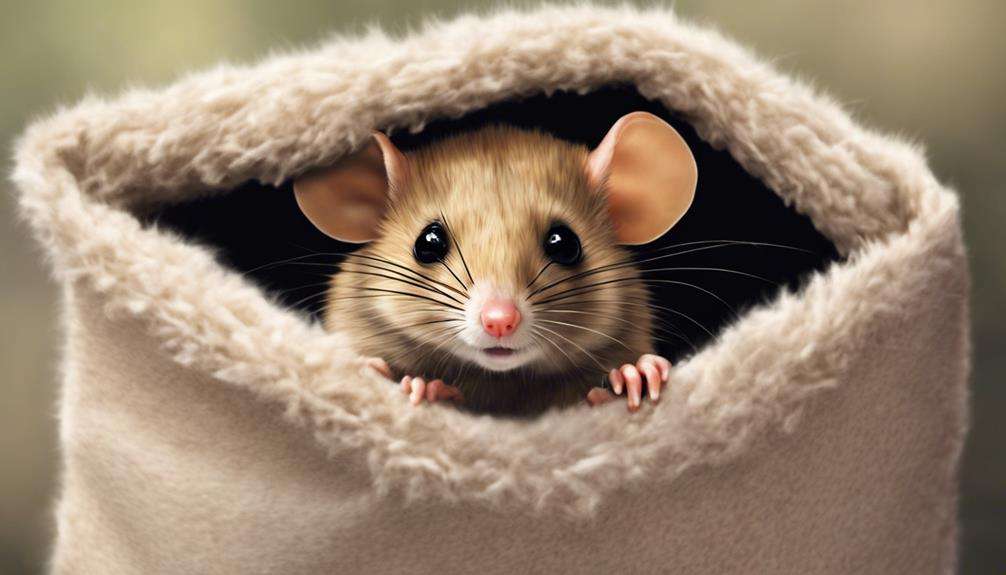
Among the lesser-known pocket pet mammals, the African Dormouse, scientifically known as Graphiurus murinus, stands out as a charming and adorable companion native to sub-Saharan Africa. This small, nocturnal mammal is characterized by its large eyes, long bushy tail, and soft fur, making it a enchanting addition to your household.
African Dormice are omnivorous creatures, relishing a diet consisting of insects, fruits, nuts, and seeds to maintain a balanced nutritional intake. Their arboreal nature means they're skilled climbers, preferring to reside in tree cavities or nest boxes when kept in captivity.
Despite their delightful presence, these adorable creatures have a relatively short lifespan of 3-5 years, requiring attentive care to guarantee their well-being throughout their time with you. Providing suitable nest boxes and a diverse diet will contribute to the health and happiness of your African Dormouse companion.
Pocket Pet Mammal: Fat-Tailed Gerbil
Hailing from the regions of North Africa and the Middle East, the Fat-Tailed Gerbil, also known as a duprasi, is a small rodent distinguished by its unique fat storage in the tail, setting it apart from other pocket pet mammals.
These social animals thrive in pairs or small groups, exhibiting a strong preference for interaction and play with their companions.
To guarantee their well-being, a balanced diet for fat-tailed gerbils includes seeds, grains, vegetables, and occasional insects to meet their nutritional requirements.
Providing a suitable habitat is vital for their longevity, as with proper care, these pocket pets can live up to 5-7 years in captivity.
Understanding the importance of socialization and a varied diet is key to fostering a healthy and engaging environment for fat-tailed gerbils, making them fascinating and rewarding additions to the world of pocket pet mammals.
Pocket Pet Mammal: Pygmy Jerboa
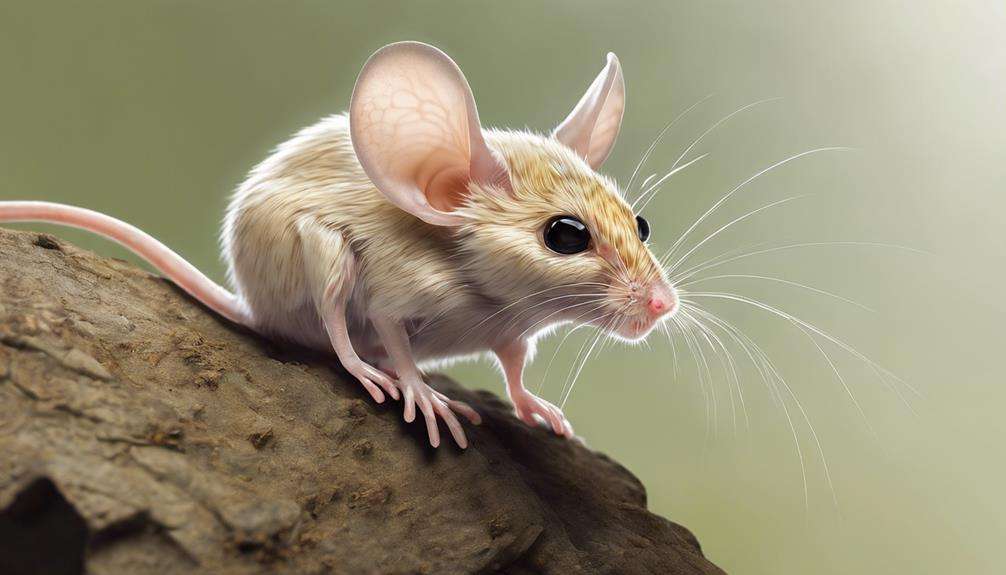
Measuring a mere 2 inches in length, the Pygmy Jerboa is renowned as one of the smallest rodents globally, exhibiting distinctive features such as large ears and a tufted tail. Native to Pakistan and Afghanistan, these small rodents thrive in desert habitats, where they're primarily nocturnal. Their diet consists of insects, seeds, and plants found in these arid regions. Pygmy Jerboas possess powerful hind legs that enable them to hop like kangaroos, covering impressive distances of up to 9 feet in a single bound.
Despite their adorable appearance, Pygmy Jerboas have specialized care requirements due to their fragile nature. This makes them challenging to keep as pets, and they're best observed in the wild. Their delicate ecosystem and specific habitat needs highlight the importance of conservation efforts to make sure the survival of these unique creatures in their natural environment. For those fortunate enough to witness them in the wild, the sight of a Pygmy Jerboa hopping through the desert under the moonlight is a truly enchanting experience.
Frequently Asked Questions
What Is the Best Pocket Pet to Have?
When deciding on the best pocket pet, consider factors like your lifestyle and preferences. Sugar gliders, hedgehogs, chinchillas, degus, and other unique options have specific needs that require attention and care for their well-being.
What Is the Most Uncommon Pet to Own?
The most uncommon pet to own could be a sugar glider, a small marsupial known for its gliding ability. Axolotls, also known as Mexican walking fish, are rare aquatic pets with regenerative abilities. Wallabies, miniature kangaroos, are unique exotic pets that require specialized care and space. Pygmy goats are rare household pets known for their playful and social nature. Tamanduas, also known as lesser anteaters, are unusual pets that require a specialized diet and environment.
What Is the Easiest Exotic Pet to Own?
When choosing an exotic pet, consider hedgehogs as a top choice. They are low maintenance companions with unique personalities. To care for them, offer a suitable environment and specific diet. They are budget-friendly, beginner-friendly, interactive, and adorable critters.
What Small Pet Is the Friendliest?
When considering friendliness, hamsters and gerbils both make great choices for interactive pets. Guinea pigs and mice are social animals that enjoy human interaction. Rabbits, ferrets, chinchillas, and hedgehogs have different temperaments. Sugar gliders, degus, and rats are known for forming bonds with owners.
Conclusion
To sum up, when selecting a pocket pet mammal, consider exploring lesser-known options such as the Jerboa, Pygmy Possum, African Dormouse, Fat-Tailed Gerbil, and Pygmy Jerboa.
These unique animals offer fascinating companionship and can bring joy to your life in unexpected ways.
Remember, sometimes the best things come in small packages, so don't be afraid to step outside the box and discover the hidden gems of the animal kingdom.
